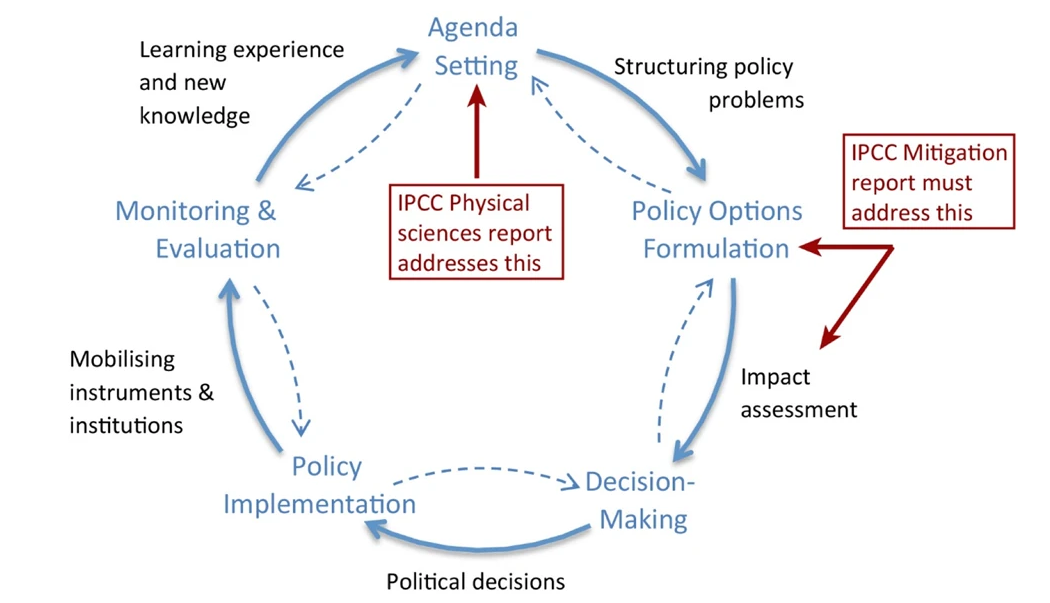The Role of the IPCC in Assessing Actionable Evidence for Climate Policymaking
Our Founder, Professor Terry Barker, has co-authored a paper in Nature NPJ Climate Action.
With climate policymakers around the world seeking inputs from the research community to help determine appropriate policies to reduce greenhouse gas emissions, the paper focusses on how the Intergovernmental Panel on Climate Change’s (IPCC) Working Group III (WGIII) – that focuses on mitigation – feeds into the policy debate. Drawing on the example of alternative climate-economic modelling (using the E3ME-FTT framework), the authors also explore a pathway for the IPCC process that could cater to a more diverse range of policies – that are both more realistic and granular.
The IPCC perform the largest available analytical exercise in the realm of climate change, but offers very little in the way of climate policy design. Given the crucial importance of the next decade for climate policy, IPCC activities that are focussed on mitigation could theoretically become the most relevant. In practice, however, this does not appear to be the case – WGIII received little mainstream media coverage, receives few online searchers, and is rarely used in policy documents.
Instead, the IPCC appears to be seen by policymakers as a general source of information, rather than a body that offers solutions to mitigate climate change. Policymakers do not typically use IPCC reports to formulate climate policy frameworks, but to justify climate action.

The IPCC reports within the policy cycle from Pollitt et al. (2024)
The problem of providing evidence for climate policymaking through the IPCC process is closely linked to the IPCC’s strategy of seeking to remain policy-relevant but not policy-prescriptive. In this paper, the authors suggest that trying to remain ‘not policy prescriptive’ has led to becoming a policy prescription.
The current prescription suggests that a single global carbon price is sufficient to achieve decarbonization in a transition. From this perspective, policy design is not really needed. Further, nearly all the models used in the IPCC’s scenario analysis assume that any deviation from this prescription leads to inefficiency and loss of welfare.
The question of policy relevance in the IPCC is therefore closely related to the types of modelling tools used, with any choice of models inevitably being political. Intentional or not, the IPCC’s received message risks being one of global carbon prices and inevitable economic costs in addressing climate change in first-best scenarios, with the option of adding ‘inefficient’ non-pricing instruments to address political economy concerns in ‘more realistic’ second-best scenarios.
In total, the authors identify four critical issues that should be addressed by the IPCC in order to increase its relevance with policymakers:
- The IPCC’s scenario process is policy-prescriptive, despite aiming not to be. This approach has led to the promotion of a one-size-fits-all policy prescription for carbon pricing that lacks essential detail. Further, it impedes the IPCC’s ability to inform practical climate policy design, as it essentially suggests that none is needed.
- The IPCC’s scenario process attempts to set standardised policy narratives, rather than addressing the heterogenous practical needs in addressing climate change of the policy community worldwide.
- The needs of the policy community evolve, and do not necessarily stick to the narratives within the IPCC’s scenario analysis. As a result, the scenario analysis risks being seen as academic and impractical.
- The IPCC process is discrete rather than continuous. It offers insights just twice per decade, reviews insights that may be outdated, and is based on a timescale that is likely more suitable for climatology than policy analysis.
There are alternative modelling approaches (that are mostly detached from the IPCC) that can answer some of policymakers’ key questions. In the paper, an illustrative example of an alternative climate-economy model is presented based on the combined E3ME-FTT community modelling framework. Whilst this model does not address all the concerns raised – which would require a large ensemble of diverse models – it has a long track record of informing a range of granular policy proposals, and could be used to enrich the evidence base in support of policymaking.
One of the most important practical contributions the global community of climate experts can provide is building capacity for practical climate policymaking. In a new iteration, the IPCC could address this need – but it would require the rethinking of multiple aspects of the IPCC’s WGIII scenario process to address the real granularity of climate policy.
Read the full report on Nature NPJ Climate Action.
Pollitt, H., Mercure, J.F., Barker, T., Salas, P. and Scrieciu, S. (2024). The role of the IPCC in assessing actionable evidence for climate policymaking. npj Climate Action, 3(1), p.11.
